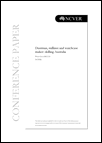Description
This paper was presented at the Professional Historians Association (NSW) Islands of History conference held on Norfolk Island in July 2010. It argues that the reliance on overseas workers to address skills shortages has been present ever since the first white settlement of Australia and suggests some areas for primary historical research.
Summary
About the research
This paper was presented at the Professional Historians Association (NSW) Islands of History conference held on Norfolk Island in July 2010. It sought to inject a policy perspective onto the practice of history by demonstrating how an examination of the past can enhance understanding of current issues, in this case the role of skilled migration in meeting the needs of Australia's labour market. It argues that the reliance on overseas workers to address skills shortages has been present ever since the first white settlement of Australia. This has, in turn, shaped attitudes to the governance of vocational education, in particular the notion of an industry-led system.
It was not until the late 19th century that the state started a concerted effort to develop the institutional structures to support local skills development, but even then employers were prone to look abroad for skilled workers. On the other hand, the organised labour movement was concerned from early on about the perceived threat to their jobs of imported labour.
In 1988 economic historian Stephen Nicholas and colleagues undertook a statistical analysis of the convicts who came to New South Wales. Theirs was an important reinterpretation, taking a human capital approach to consider the contribution of convicts and arguing that these were healthy, literate working-class people who brought necessary skills to building the colony.
This paper sets out some ideas that may warrant further investigation by historians, in order to flesh out the story of Australia's skilled migration in the 19th century and how this has influenced the development of Australia's vocational education. It will accompany an historical timeline and timeseries data which NCVER is compiling to help inform contemporary policy development.
Tom Karmel
Managing Director
